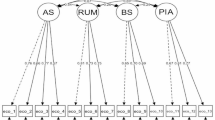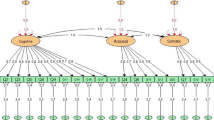Abstract
Apeiroanxiety is a fear of infinity. Some people may experience anxiety or discomfort when contemplating the vastness or endless nature of certain concepts, such as time or space. Addressing any form of anxiety is important as it can impact an individual’s daily functioning, wellbeing, and quality of life. The current study is aimed at developing a reliable and valid measure of apeiroanxiety in the context of the afterlife for the Pakistani Muslim population. The research had three studies: Query Study I generated an item pool of 18 items based on a literature review, semi-structured interviews, and expert opinion. This item pool was administered to a convenient sample of Pakistani Muslim participants (n = 1277). As a result of exploratory factor analysis, a uni-dimensional factor solution with five items was yielded (α = 0.90). Confirmatory factor analysis confirmed the obtained uni-dimensional factor solution in study II of the research with an excellent model fit. In study III, the convergent and discriminant validity of the scale was established on a separate independent sample (n = 485). Results yielded evidence of convergent validity as negative afterlife belief and rumination had a positive correlation with apeiroanxiety. The discriminant validity was established by a non-significant relationship between positive afterlife belief and apeiroanxiety. Moreover, the limitations, suggestions, and implications of the study are discussed.

Similar content being viewed by others
Data Availability
Data will be shared upon reasonable request as per data policy.
References
Abdel-Khalek, A. M. (2004). The arabic scale of death anxiety (ASDA): Its development, validation, and results in three Arab countries. Death Studies, 28(5), 435–457. https://doi.org/10.1080/07481180490437572
Ali, K., & Leaman, O. (2007). Islam: The Key Concepts: Islam: The Key Concepts. Routledge.
American Psychiatric Association. (2000). Diagnostic and statistical manual of mental disorders. 4th ed. (DSM-IV-TR). Washington, DC.
Baaren, T. P. van (2019). Monotheism. Encyclopedia Britannica. https://www.britannica.com/topic/monotheism.
Bashier, S. H. (2012). Ibn al-’Arabi’s Barzakh: The Concept of the limit and the relationship between god and the world. SUNY Press.
Boateng, G. O., Neilands, T. B., Frongillo, E. A., Melgar-Quiñonez, H. R., & Young, S. L. (2018). Best practices for developing and validating scales for health, social, and behavioral research: A primer. Frontiers in Public Health. https://doi.org/10.3389/fpubh.2018.00149
Brewminate A Bold Blend of News & Ideas (2017). Apeirophobia – The fear of eternal life and infinity. https://brewminate.com/apeirophobia-the-fear-of-eternal-life-and-infinity/
Bozman, E. (2020). Apeirophobia—Fear of infinity--. Common-phobias. https://common-phobias.com/Apeirophobia.htmChittick
Chittick, W. C. (1992). Your sight today is piercing: The Muslim understanding of death and afterlife. In H. Obayashi (Ed.), Death and Afterlife: Perspectives of the World Religions (pp. 125–139). Greenwood Press.
Cranney, S., Leman, J., Fergus, T. A., & Rowatt, W. C. (2018). Hell anxiety as non-pathological fear. Mental Health, Religion and Culture, 21(9–10), 867–883. https://doi.org/10.1080/13674676.2018.1443436
Field, D. (2005). Discovering statics using SPSS (2nd ed.). Sage Publications.
Flannelly, K. J. (2017). Religious Beliefs, Evolutionary Psychiatry, and Mental Health in America: Evolutionary Threat Assessment Systems Theory. Springer International Publishing.
Flannelly, K. J. (2017a). Beliefs About Life-After-Death and Psychiatric Symptoms. In K. J. Flannelly (Ed.), Religious Beliefs, Evolutionary Psychiatry, and Mental Health in America: Evolutionary Threat Assessment Systems Theory (pp. 173–182). Springer International Publishing. https://doi.org/10.1007/978-3-319-52488-7_18
Flannelly, K. J., Ellison, C. G., Galek, K., & Koenig, H. G. (2008). Beliefs about life-after-death, psychiatric symptomology and cognitive theories of psychopathology. Journal of Psychology and Theology, 36(2), 94–103. https://doi.org/10.1177/009164710803600202
Flannelly, K. J., Ellison, C. G., Galek, K., & Silton, N. R. (2012). Belief in life-after-death, beliefs about the world, and psychiatric symptoms. Journal of Religion and Health, 51(3), 651–662. https://doi.org/10.1007/s10943-012-9608-7
Flannelly, K. J., Koenig, H. G., Ellison, C. G., Galek, K., & Krause, N. (2006). Belief in life after death and mental health: Findings from a national survey. The Journal of Nervous and Mental Disease, 194(7), 524–529. https://doi.org/10.1097/01.nmd.0000224876.63035.23
Ghayas, S., & Batool, S. S. (2016). Construction and validation of afterlife belief scale for Muslims. Journal of Religion and Health, 56(3), 861–875. https://doi.org/10.1007/s10943-016-0258-z
Gregory, R. J. (2014). Psychological testing: History, principles and applications. Pearson Publishers.
Harrington, J. A., & Blankenship, V. (2002). Ruminative thoughts and their relation to depression and anxiety 1. Journal of Applied Social Psychology, 32(3), 465–485. https://doi.org/10.1111/j.1559-1816.2002.tb00225.x
Hartley, C. A., & Phelps, E. A. (2012). Anxiety and decision-making. Biological Psychiatry, 72(2), 113–118. https://doi.org/10.1016/j.biopsych.2011.12.027
Helm, P. (2010). Eternal God. Oxford University Press. https://doi.org/10.1093/acprof:oso/9780199590391.001.0001
Javed, M. (2011). A survey of examination phobia amongst students at secondary school level. Journal of Education and Vocational Research, 1(1), 4–12. https://doi.org/10.22610/jevr.v1i1.2
Kaiser, H. F. (1974). A computational starting point for Rao’s canonical factor analysis: Implications for computerized Procedures. Educational and Psychological Measurement, 34(3), 691–692.
Kendler, K. S., Jacobson, K. C., Myers, J., & Prescott, C. A. (2002). Sex differences in genetic and environmental risk factors for irrational fears and phobias. Psychological Medicine, 32(2), 209–217. https://doi.org/10.1017/S003329170100513X
Kendler, K. S., Myers, J., Prescott, C. A., & Neale, M. C. (2001). The genetic epidemiology of irrational fears and phobias in men. Archives of General Psychiatry, 58(3), 257–265. https://doi.org/10.1001/archpsyc.58.3.257
McCullough, M. E., Orsulak, P., Brandon, A., & Akers, L. (2007). Rumination, fear, and cortisol: An in vivo study of interpersonal transgressions. Health Psychology, 26(1), 126–132. https://doi.org/10.1037/0278-6133.26.1.126
Olatunji, B. O., Naragon-Gainey, K., & Wolitzky-Taylor, K. B. (2013). Specificity of rumination in anxiety and depression: A multimodal meta-analysis. Clinical Psychology: Science and Practice, 20(3), 225. https://doi.org/10.1111/cpsp.12037
Olesen, J. (n.d.). Fear of infinity phobia – Apeirophobia. Fearof.net. https://www.fearof.net/fear-of-infinity-phobia-apeirophobia/#comments
Prabhu, C. (2016). Why do we have such a hard time grasping the concept of infinity? Linkedin. https://www.linkedin.com/pulse/why-do-we-have-hard-time-grasping-concept-infinity-chetan-prabhu/
Ramli, M. H. A. B., Mazlan, N. A. B., Azmi, S. A. B., Bulat, M. S. B. A., & Kaur, P. (2018). Life after death in a chinese community. Trends in Undergraduate Research, 1(1), 32–38. https://doi.org/10.33736/tur.1182.2018
Sharif Nia, H., Ebadi, A., Lehto, R. H., & Peyrovi, H. (2015). The experience of death anxiety in Iranian war veterans: a phenomenology study. Death Studies, 39(5), 281–287. https://doi.org/10.1080/07481187.2014.991956
Skevington, S. M., Lotfy, M., & O’Connell, K. A. (2004). The world health organization’s WHOQOL-BREF quality of life assessment: Psychometric properties and results of the international field trial. A report from the WHOQOL group. Quality of Life Research, 13(2), 299–310. https://doi.org/10.1023/B:QURE.0000018486.91360.00
Smith, J. L., & Haddad, Y. Y. (2002). The Islamic understanding of death and resurrection. Oxford University Press.
Theodore. (2020). Apeirophobia - The fear of infinity. Retrieved from https://practicalpie.com/apeirophobia/.
Younis, S., & Ghayas, S. (2020). Relationship of Rumination and Forgiveness with Psychopathological symptoms Among University Students; Role of Anger and Vengeance. (Unpublished master's thesis). Sargodha University, Sargodha.
Acknowledgements
We extend our sincere appreciation to Nayyar Taban for her exceptional dedication and invaluable assistance in data collection, which significantly enriched the findings of this research endeavor.
Funding
This research project is not funded by any source.
Author information
Authors and Affiliations
Corresponding author
Ethics declarations
Conflict of interest
There is no conflict of interest among all authors.
Ethical Approval
Topic and research process was approved by IRB, Department of Psychology, University of Sargodha.
Informed Consent
Before data collection, informed consent was taken from the participants.
Additional information
Publisher's Note
Springer Nature remains neutral with regard to jurisdictional claims in published maps and institutional affiliations.
Appendix
Appendix
English Version of Apeiroanxiety Scale
1 | I am afraid that after my death, I will be left alone in the grave forever |
2 | Contemplating the endless difficulties of the hereafter makes my heart feel anxious |
3 | Among all aspects of the afterlife, its boundlessness scares me the most |
4 | The thought of residing in the grave for an infinite amount of time terrifies me |
5 | I am afraid of the never-ending solitude that comes with the grave |
Urdu Version of Apeiroanxiety Scale

Rights and permissions
Springer Nature or its licensor (e.g. a society or other partner) holds exclusive rights to this article under a publishing agreement with the author(s) or other rightsholder(s); author self-archiving of the accepted manuscript version of this article is solely governed by the terms of such publishing agreement and applicable law.
About this article
Cite this article
Bilal, Z., Ghayas, S., Adil, A. et al. Development and Validation of Apeiroanxiety Scale in the Context of the Afterlife for Pakistani Muslim Adults. J Relig Health 63, 1642–1660 (2024). https://doi.org/10.1007/s10943-023-01996-0
Accepted:
Published:
Issue Date:
DOI: https://doi.org/10.1007/s10943-023-01996-0




